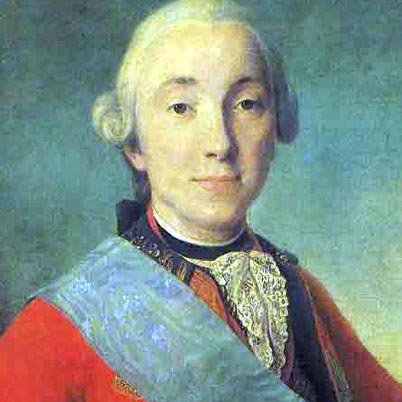
Peter III was the emperor of Russia for a mere six months in 1762. During his reign, he withdrew from the Seven Years War and formed an alliance with Prussia to wage war against Denmark, which made him an unpopular leader. His wife, Catherine the Great, suspected he was set to divorce her and conspired with her lover to overthrow him. He was subsequently assassinated on July 17, 1762, in Ropsha, Russia.
Early Life
Peter III was born Karl Peter Ulrich on February 21, 1728, in Kiel, in the duchy of Schleswig-Holstein in northern Germany. The only son of Anna Petrovna and Charles Frederick, Duke of Holstein-Gottorp, he was the grandson of two emperors, Peter the Great of Russia and Charles XII of Sweden. Karl’s parents died when he was young, and he was placed in the care of tutors and officials at the Holstein court, who groomed him for the Swedish throne.
Karl was cruelly raised by his mentors and punished for being a poor student. Though he showed interest in the arts, he failed nearly every academic subject. He loved military parades and dreamt of being a world-famous military warrior. At 14, he was brought to Russia by his aunt Elizabeth when she became empress, renamed Pyotr Fyodorovich, and proclaimed heir to the throne. Peter resented living in Russia and often complained the Russian people would never accept him.
A Contentious Marriage
On August 21, 1745, Peter married Sophie Frederica Auguste, a princess from Anhalt-Zerbst in Saxony, who took the name Catherine. The marriage, politically arranged by Peter’s aunt, was a disaster from the start. Catherine was a young woman of prodigious intellect, while Peter was a child in a man’s body. They had one son, Paul, the future emperor, and a daughter, Anna, who died before she was 2. Later, Catherine alleged that Paul was not Peter’s son and that she and Peter had never consummated their marriage. During their 16 years together, Catherine and Peter took numerous lovers.
It is believed Empress Elizabeth shielded Peter from government affairs, possibly because she suspected he was mentally incapable. He hated being in Russia. His allegiance was towards his homeland and Prussia. He didn’t care about Russia’s people and hated the Orthodox Church. Nonetheless, Peter succeeded Elizabeth when she died on December 25, 1761. Much of what has been known about Peter III was drawn from his wife’s memoirs, which depict him as an idiot and a drunkard, prone to brutal practical jokes and interested only in playing soldier.
A Controversial Reign
Once on the throne, Peter III reversed his aunt’s foreign policy, withdrew Russia from the Seven Years War and struck an alliance with Prussia, Russia’s enemy. He set out to wage war against Denmark and gain back his native land of Holstein. The move was seen as a betrayal of Russian war sacrifices and alienated him politically among the military and powerful court cliques. While historically Peter’s actions have been viewed as treachery, recent scholarship has suggested they may have been part of a pragmatic plan to expand Russia’s influence westward.
Peter III also instituted many domestic reforms that today seem democratic, including proclaiming religious freedom, abolishing the secret police and outlawing the killing of serfs by their landowners. He established the first state bank in Russia and encouraged mercantilism by increasing grain exports and placing embargos on materials that could be found in Russia.
There is wide speculation as to Peter III’s demise. Traditionally, it has been believed that he had alienated the Orthodox Church and much of the nobility with his reforms. Because his personality and policies were seen as so bizarre and unpredictable, these factions went to Catherine for help and plotted against him. But recent scholarship points to Catherine as the mastermind of a conspiracy to rid herself of her husband because she thought he was going to divorce her. On June 28, 1762, Peter III was arrested and forced to abdicate. He was taken to Ropsha, outside St. Petersburg, where he was supposedly assassinated on July 17, though this has never been confirmed. Some evidence shows he might have committed suicide.
